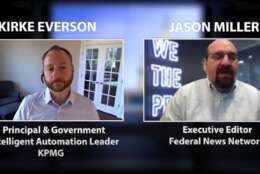artificial intelligence
-
How the agency curates, grows, stores and manages its data will determine how effective it will be at deploying AI/ML applications, according to Gary Hix, the chief technology officer at Hitachi Vantara Federal.
May 21, 2021 -
The pandemic is a recent example of new applications for machine learning and data analytics in national security.
May 20, 2021 -
Speed of decision-making will be an increasingly important capability for Defense Department planners. According to Josh Wilson, the senior vice president of service lines and technology at LMI, those capabilities will, in turn, require the insertion of artificial intelligence and machine learning into their basic functionality.
April 30, 2021 -
In today's Federal Newscast, Senators Gary Peters (D-Mich.) and John Thune (R-S.D.) introduced bipartisan legislation to help the government remain competitive in employing artificial intelligence talent.
April 22, 2021 -
While some agencies have already begun leveraging artificial intelligence and machine learning to perform analytics and begin putting that data to use, many others are still exploring use cases and only just becoming aware of the possibilities.
March 18, 2021 -
One area that is particularly ripe for AI adoption is the transportation sector.
March 15, 2021 -
Hosted by Dr. Richard Shurtz and Jim Russ. Sponsored by Stratford University. Using artificial intelligence to tell the story of the Holocaust. And we get to know Elon Musk.
February 01, 2021 -
Federal News Network’s Tom Temin interviewed Elliot to better understand the impediments to taking AI to production levels, and the best practices for overcoming them.
January 11, 2021 -
Kirke Everson, a principal and government intelligent automation leader at KPMG, said a lot of agencies are still in the early stages of applying intelligent automation to their business processes.
December 30, 2020 -
Nicholas Speece, the chief federal technologist at Snowflake, said the opportunity to use AI and machine learning to improve mission delivery across all industries, government and private sector, is substantial.
March 30, 2020 -
Moving into AI and machine learning is not something agencies can just jump into, they have to develop roadmaps, use cases and workforce skillsets to get to the benefits of these emerging technologies—better decision making.
March 24, 2020 -
Nearly every agency is discovering the potential benefits of applying advanced analytics and intelligence automation tools to their mission areas.
March 03, 2020 -
With the massive explosion of data being collected, stored, analyzed and put to use in the federal community, the capacity for humans to operate at such a scale is beginning to fall behind. So agencies are looking to technology to pick up the slack.
January 28, 2020 -
When it comes to data, it’s easy for federal managers to get caught up in the hype and put the cart before the horse.
January 06, 2020 -
The opportunities for federal financial managers to use RPA and other emerging technologies is great, but they also must overcome these and other challenges to take full advantage of this latest technology innovation.
November 26, 2019















